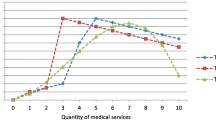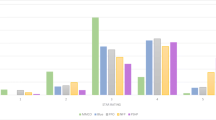Abstract
Managed care (MC) imposes restrictions on physician behavior, but also holds promises, especially in terms of cost savings and improvements in treatment quality. This contribution reports on private-practice physicians’ willingness to accept (WTA, compensation asked, respectively) for several MC features. In 2011, 1,088 Swiss ambulatory care physicians participated in a discrete choice experiment, which permits putting WTA values on MC attributes. With the exception of shared decision making and up to six quality circle meetings per year, all attributes are associated with non-zero WTA values. Thus, health insurers must be able to achieve substantial savings in order to create sufficient incentives for Swiss physicians to participate voluntarily in MC plans.

Similar content being viewed by others
Notes
Principal GPs have ownerships in their practice, whereas sessional GPs are freelancers (mainly young females with childcare responsibilities) and employees of NHS boards (Scotland).
The RCM (or mixed logit) model is a generalization of the standard logit model. The RCM reduces to the standard model if density f(β) = 1 for β = b and 0 for β ≠ b. Further, the random-intercept logit model (RIM, also called random-effects model) treats the constant as normally distributed with all other coefficients kept fixed.
This is irrelevant to this study, which is of the binary choice type.
References
Beardow, R., Cheung, K., Styles, W.: Factors influencing the career choices of general practitioner trainees in North West Thames Regional Health Authority. Br. J. General Pract. 143, 449–452 (1993)
Benarroch, M., Hugh, G.: The interprovincial migration of Canadian physicians: does income matter?. Appl. Econ. 36(20), 2335–2345 (2004)
Buddeberg-Fischer, B., Klaghöfer, R.: Geschlecht oder Persönlichkeit? Determinanten der Karrierepläne angehender Ärztinnen und Ärzte. (Gender or personality? Determination of career plans of future physicians). In: Abele A., Hoff E.-H., Hohner H.-U. (eds). Frauen und Männer in akademischen Professionen. Berufsverläufe und Berufserfolg (2003)
Buddeberg-Fischer, B., Klaghöfer, R., Stamm, M., Marty, F., Dreiding, P., Zoller, M., Buddeberg, C.: Primary care in Switzerland—no longer attractive for young physicians? Swiss Med. Wkly. 136, 416–424 (2006)
De Becker-Grob, E.W., Ryan, M., Gerard, K.: Discrete choice experiments in health economics: a review of the literature. Health Econ. doi:10.1002/hec.1697 (2010)
Deveugele, M., Derese, A., van den Brink-Muinen, Bensing, J., De Maeseneer, J.: Consultation length in general practice: cross sectional study in six European countries. Bri. Med. J. 325, 472–478 (2002)
Dionne, G., Contandriopoulos, A.: Doctors and their workshops: a review article. J. Health Econ. 4, 21–33 (1985)
Enthoven, A.: Consumer-choice health plan. N. Engl. J. Med. 298(22), 1223–1238 (1978)
Feldstein, M.: The rising price of physicians’ services. Rev. Econ. Stat. 52, 121–133 (1970)
Gagne, R., Leger, P.: Determinants of physicians’ decision to specialize. Health Econ. 14(7), 721–735 (2005)
Glied, S.: Managed care. In: Culyer, A.J., Bewhouse, J.P. (eds.) Handbook of Health Economics, vol. 1, Chap. 13, pp. 707–753. North-Holland Publishing Company, Amsterdam (2000)
Hole, A.: Fitting mixed logit models by using maximum simulated likelihood. Stata J. 7(3), 388–401 (2007)
Hole, A.: Modelling heterogeneity in patients’ preferences for the attributes of a general practitioner appointment. J. Health Econ. 27, 1078–1094 (2008)
Kraft, E.: 30’273 Ärztinnen und Ärzte für die Schweiz (30,273 physicians for Switzerland). Schweizer Ärztezeitung 92(12), 440–444 (2010)
Kristiansen I.: What is in the doctor’s utility function? A theoretical and empirical investigation into what influences doctors’ decision making. Dissertation, University of Tromso (1994)
Kristiansen, I.: Medical specialists’ choice of location: the role of geographical attachment in Norway. Soc. Sci. Med. 34(1), 57–62 (1992)
Künzi, K., Strub, S., Stocker, D.: Erhebung der Einkommenverhältnisse der berufstätigen Ärtzeschaft (Census of earning capacity of the working medical fraternity). Schweizerische Ärztezeitung 92(36), 1361–1366 (2011)
Labelle, R., Stoddart, G., Rice, T.: A re-examination of the meaning and importance of supplier-induced demand. J. Health Econ. 13, 347–368 (1994)
Louviere, J.J., Hensher, D.A., Swait, J.D.: Stated Choice Methods. Analysis and Applications. University Press, Cambridge (2000)
Luce, D.: Individual Choice Behavior. Wiley, New York (1959)
Manski, C.F.: The structure of random utility models. Theor. Decis. 52, 229–254 (1977)
Marinoso, B., Jelovac, I.: GPs’ payment contracts and their referral practice. J. Health Econ. 22(4), 617–635 (2003)
McFadden, D.: Econometric models of probabilistic choice. In: Manski, C., McFadden, D. (eds) Structural Analysis of Discrete Data with Applications, pp. 198–272. The MIT Press, Cambridge (1981)
McFadden, D.: Economic choices. Am. Econ. Rev. 91, 351–378 (2001)
McGuire, T.G.: Physician agency. In: Culyer, A.J., Newhouse, J.P. (eds) Handbook of Health Economics, vol. 1, Chap. 9, pp. 461–536. North-Holland Publishing Company, Amsterdam (2000)
Nordt, C.: Strukturwandel der medizinischen Grundversorgung. Ursachen und Wirkungen der ärztlichen Arbeitszufriedenheit in unterschiedlichen Praxismodellen. (Structural changes in primary medical practice. Determinants and consequences of physicians’ job satisfaction in different settings). Dissertation, submitted for the Factulty of Philosophy, University of Zurich (2003)
Pauly, M.: Editorial: A re-examination of the meaning and importance of supplier-induced demand. J. Health Econ. 13, 369–372 (1994)
Revelt, D., Train, K.E.: Customer-specific taste parameters and mixed logit. Working paper (1999)
Richardson, J.: The inducement hypothesis: that doctors generate demand for their own service. In: Gaag, J., Perlman, M. (eds) Health, Economics and Health Economics., pp. 189–214. North-Holland Publishing Co., Amsterdam (1981)
Rischatsch, M., Trottmann, M., Zweifel, P.: Generic substitution, financial interests, and imperfect agency. Working paper (2010)
Ruud, P.: Simulation of the multinomial probit model: An analysis of covariance matrix estimation. working paper (1996)
Ryan, M.: A comparison of stated preference methods for estimating monetary values. Health Econ. 13(3), 291–296 (2004)
Ryan, M., Gerard, K.: Using discrete choice experiments to value health care programmes: current practice and future reflections. Appl. Health Econ. Health Policy 2(1), 55–64 (2003)
Scanlon, D., Chernew, M., Lave, J.: Consumer health plan choice. Annu. Rev. Public Health 18, 507–528 (1997)
Scott, A.: Eliciting GPs’ preferences for pecuniary and non-pecuniary job characteristics. J. Health Econ. 20, 329–347 (2001)
Scott, A.: Giving things up to have more of others. the implications of limited substitutability in eliciting preferences for health and health care. Discussion paper 01/98, Health Economics Research Unit, University of Aberdeen (1998)
Sillano, M., Ortuzar, J.D.D.: Willingness-to-pay estimation with mixed logit models:some new evidence. Environ Plann. A 37, 525–550 (2005)
Sloan, F.: The demand for higher education: the case of medical school applicants. J. Human Resour. 6(4), 466–489 (1971)
Train, K.E.: Discrete Choice Methods with Simulation. University Press, Cambridge (2003)
Trottmann, M., Zweifel, P., Beck, K.: Supply-side and demand-side cost sharing in deregulated social health insurance: which is more effective?. J. Health Econ. 31, 231–242 (2012)
Ubach, C., Scott, A., French, F., Awramenko, M., Needham, G.: What do hospital consultants value about their job? A discrete choice experiment. Br. Med. J. 326, 1432–1438 (2003)
Wordsworth, S., Skatun, A., Scott, A., French, F.: Preferences for general practice jobs: a survey of principals and sessional GPs. Br. J. Gen. Pract. 54(507), 740–746 (2004)
Zweifel, P.: Supplier-induced demand in a model of physician behavior. In: Gaag, J., Perlman, M. (eds) Health, Economics and Health Economics, North-Holland Publishing Co., Amsterdam (1981)
Zweifel, P., Telser, H., Vaterlaus, S.: Consumer resistance against regulation: the case of health care. J. Regul. Econ. 29(3), 319–332 (2006)
Acknowledgements
The authors would like to express their thanks to Dr. med. Jacques de Haller and Dr. med. Ignazio Cassis from the Swiss Medical Association (FMH) for making the experiment for the present analysis possible. Support by Martina Hersperger and Esther Kraft is also gratefully acknowledged. Special thanks go to Dr. Maria Trottmann and Dr. Harry Telser for their very helpful comments.
Author information
Authors and Affiliations
Corresponding author
Appendix
Appendix
See Table 8.
Rights and permissions
About this article
Cite this article
Rischatsch, M., Zweifel, P. What do physicians dislike about managed care? Evidence from a choice experiment. Eur J Health Econ 14, 601–613 (2013). https://doi.org/10.1007/s10198-012-0405-8
Received:
Accepted:
Published:
Issue Date:
DOI: https://doi.org/10.1007/s10198-012-0405-8




